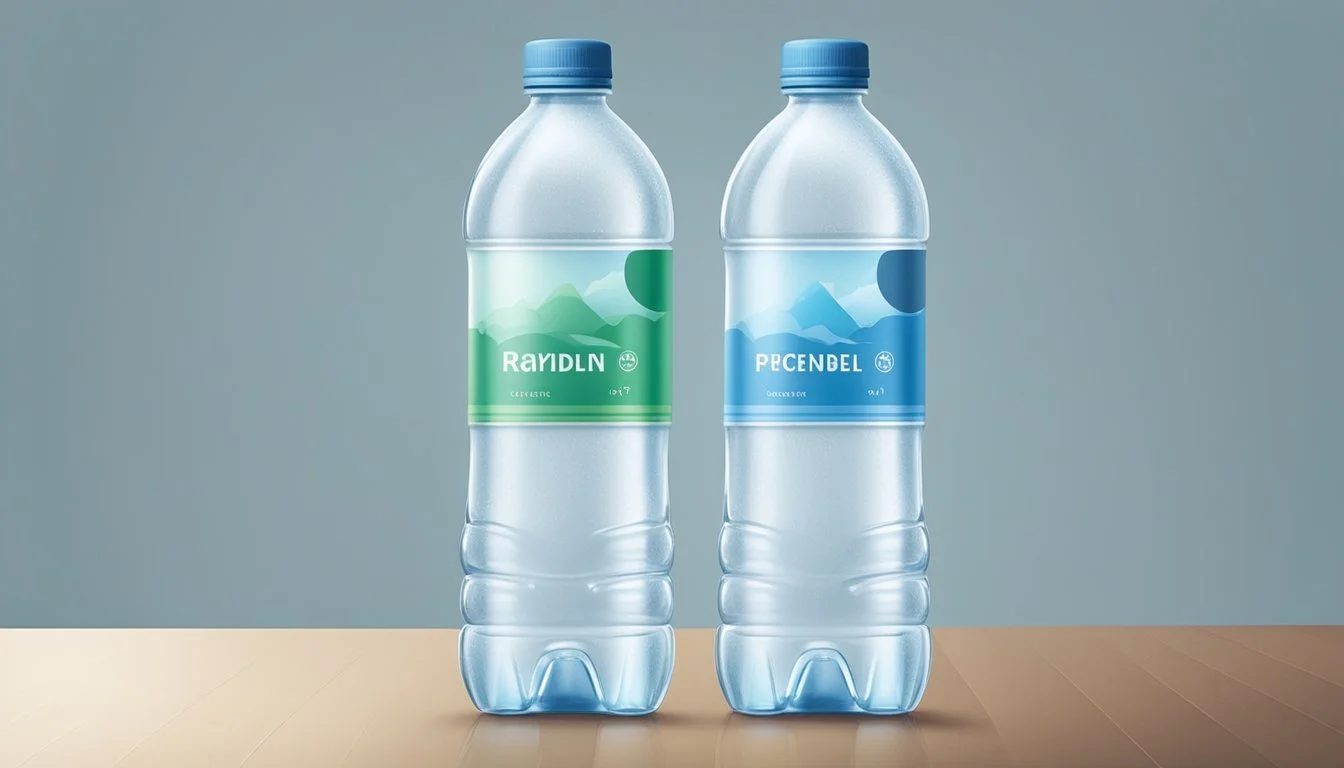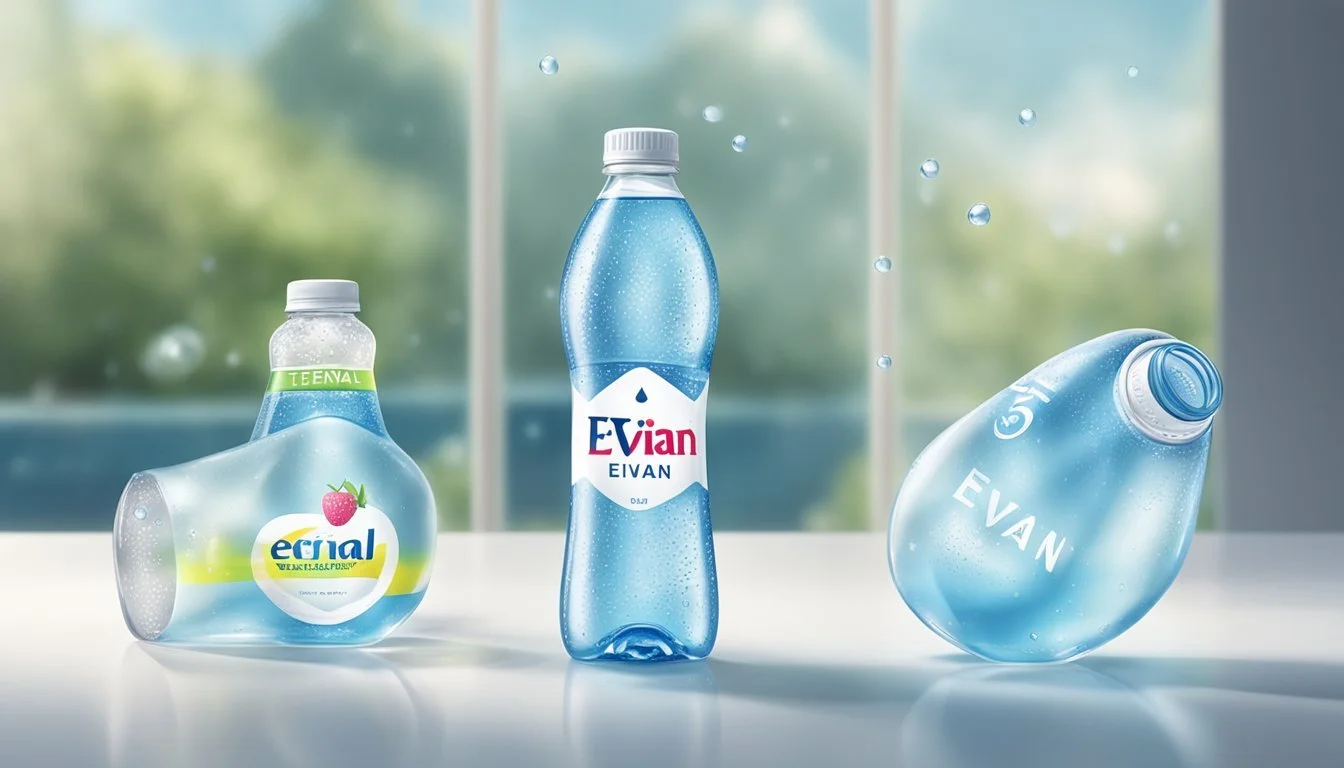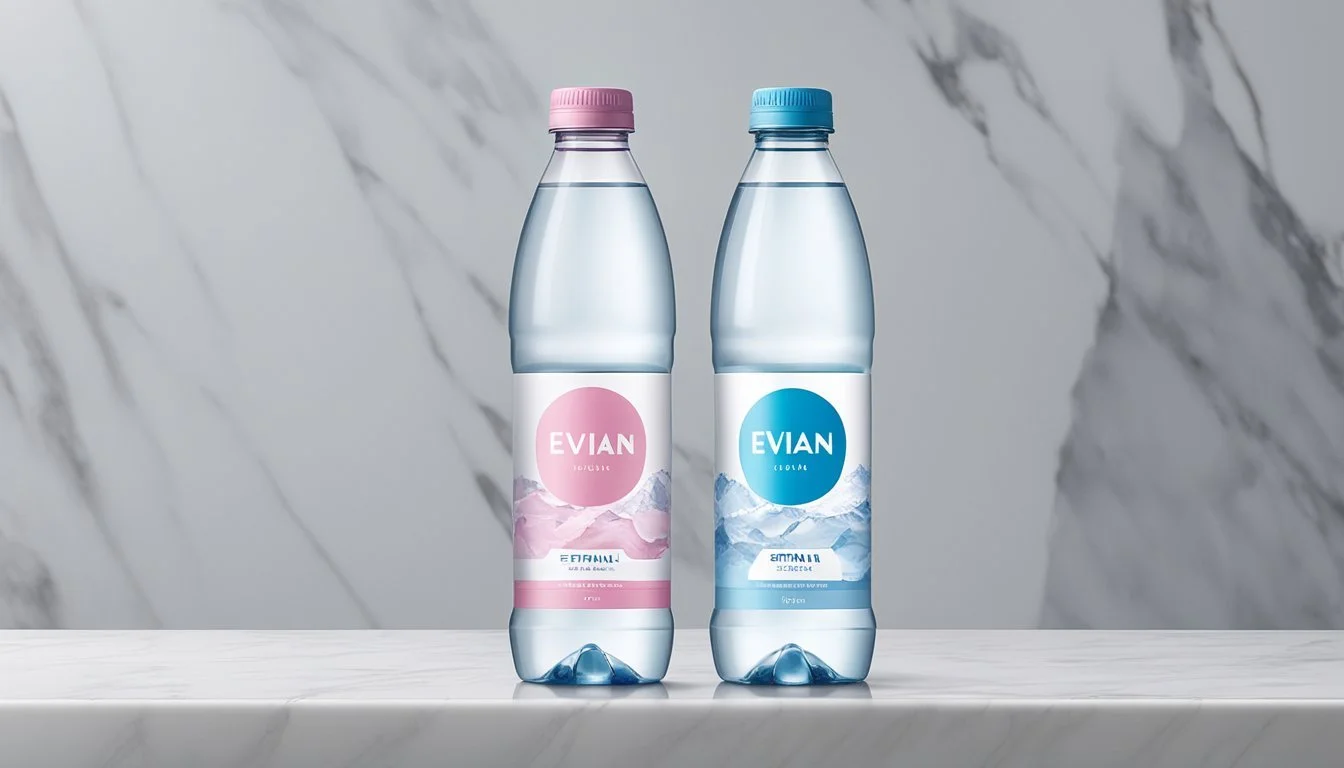Eternal vs. Evian
Comparing Bottled Water Brands for Quality and Taste
In the realm of bottled water, discerning consumers are often confronted with a plethora of choices, each brand claiming superiority over the other. Eternal and Evian represent two such brands within this competitive landscape. Eternal Natural Alkaline Spring Water emerges from the Shasta-Trinity Alps in California, offering a higher pH level due to its natural alkalinity and a composition enhanced with minerals and electrolytes. Evian, sourced from the French Alps, is characterized by its unique balance of minerals, the product of a 15-year journey through glacial rocks.
While Eternal appeals to those seeking alkalinity and a mineral-infused hydration experience, Evian has long stood as a symbol of premium bottled water, its name at one time being synonymous with luxury in the bottled water market. The brand loyalty Evian has engendered over time competes with the growing consumer demand for water with specific health benefits, a segment where Eternal is positioning itself assertively.
The choice between Eternal and Evian is not merely one of taste preference; it encompasses factors such as the water's source, the purported health benefits, and the environmental impact of the bottling process. Consumers make their selection based on what aligns best with their hydration needs and personal values, weighing the merits of natural mineral content against the desire for alkaline water. As awareness of the nuances between different bottled water brands grows, the debate over which water is better continues to evolve.
Overview of Bottled Water Brands
In the market of bottled water, brands differentiate themselves through taste, source purity, and packaging. Consumers gravitate toward options that align with their preferences and values.
Defining Bottled Water Brands
Bottled water brands are companies that process and package water for retail sale. This product segment comprises a variety of types, such as spring water, mineral water, purified water, and enhanced water. Brands like Eternal and Evian are renowned for their distinctive sources and branding. Eternal comes from natural springs in the United States, while Evian is sourced from the French Alps. Each brand's water is characterized by its unique mineral content and taste profile due to its source.
Popularity and Consumer Choices
Popularity among bottled water brands can be influenced by factors such as taste, source, health benefits, and environmental impact. Some brands stand out due to their global presence and consumer loyalty. Here are examples of popular brands according to various sources:
Evian: Recognized for its clean, smooth taste with subtle mineral notes.
Fiji: Noted for its source from Fijian aquifers, giving it a distinct profile.
Consumer choices also depend on the brand's commitment to sustainability, such as using recycled materials in their bottles. Brands that prioritize eco-friendly practices tend to gain favor with environmentally concerned customers.
The Eternal vs. Evian Debate
In the realm of premium bottled water, Eternal and Evian have emerged as recognizable brands, each with their own heritage and devoted following. The discussion hinges on their origin stories, production quality, and brand representation in the market.
Brand History and Image
Eternal is a brand known for its natural artesian water, which is touted as being sourced from a protected aquifer. This brand prides itself on offering water that's both pure and untouched by human processing, which is a significant part of its identity.
Evian, on the other hand, has established its image around the natural spring water it provides, sourced from the French Alps. The brand's history dates back to 1789, giving it a longstanding reputation as a natural, premium water provider. Evian's branding efforts have focused on promoting its Alpine origin, stressing the purity and natural filtration process of its water.
Source and Production Methods
Eternal and Evian differ notably in their source and production methods:
Eternal
Source: Natural artesian aquifer
Production: Minimally processed to maintain purity
Packaging: Information not provided in the current context
Evian
Source: French Alps natural springs
Production: Natural filtering process through glacial sand, bottled at source
Packaging: Uses bottles made from 35% recycled plastic
Both brands emphasize the natural origins of their water, but Evian specifically highlights its commitment to sustainability through its packaging choices.
Marketing and Brand Perception
Marketing strategies for Eternal and Evian are both designed to reflect each brand's unique selling points:
Eternal: Marketed mainly through the lens of its untouched quality, aiming to attract consumers seeking water that's as close to nature as possible.
Evian: Champions its long history and the purity of the French Alps, often associating its image with luxury and high-end lifestyles.
Brand perception is influenced by these marketing narratives. Eternal is often viewed as an emerging brand in the premium water sector, while Evian is perceived as an established brand with a luxurious standard in the industry.
Health and Hydration
When comparing Eternal and Evian bottled waters, the focus often centers on their ability to hydrate and their respective mineral contents, which can contribute to overall health and hydration.
Hydration and Its Importance
Hydration is crucial for maintaining bodily functions, as every cell, tissue, and organ requires water to work efficiently. Water aids in regulation of body temperature, metabolism, and waste removal. Adequate hydration is also essential for maintaining blood volume and electrolyte balance.
Eternal Water: Naturally alkaline, comes from springs and aquifers. It's known for electrolyte presence, which can enhance hydration.
Evian Water: Sourced from the French Alps, contains naturally occurring electrolytes and minerals.
Health Benefits of Mineral Content
Minerals in water, such as calcium, magnesium, and potassium, contribute to its nutritional profile and offer various health benefits.
Calcium: Important for bone health and plays a role in heart, muscle, and nerve functions.
Magnesium: Supports a healthy immune system, maintains normal nerve and muscle function, and is part of the bone formation process.
Potassium: Helps to regulate fluid balance and is essential for proper cell function.
Mineral Eternal Water Evian Water Calcium Moderate amount, contributes to bone health and muscle function. Present, offers benefits for bones and digestion. Magnesium Contains magnesium for metabolism and muscle function. Magnesium-rich supporting energy production and enzymatic reactions. Potassium Levels that assist in electrolyte balance and cellular functions. Adequate potassium, aids in fluid balance and muscle contractions.
Both Eternal and Evian waters provide valuable minerals that promote hydration and health. However, the exact benefits may vary based on the individual's needs and the specific mineral content of each bottled water brand.
Water Quality and Purification
In evaluating Eternal and Evian bottled water, a comparison of their purification processes and the resulting water quality is essential. This includes an analysis of purity, mineral content, and pH levels.
Purity and Purification Processes
Eternal bottled water is known for its natural purification, as it originates from deep underground sources. The water is filtered naturally as it flows through layers of rock which impart minerals and produce water of high purity without the need for industrial processing.
Evian, by contrast, undergoes a unique filtration process that spans over 15 years as water travels from the original source, a glacier, through layers of mineral-rich glacial sands deep in the heart of the French Alps. No artificial purification processes are applied, and the water remains untouched by man until it is bottled.
Purification Methods:
Eternal: Natural Filtration
Evian: Glacial Sand Filtration
Mineral Content and pH Levels
The mineral content and pH levels of bottled water can significantly affect its taste and potential health benefits.
Eternal Water:
Mineral Content: Naturally occurring electrolytes and minerals
pH Levels: Alkaline, typically above 7.8, promoting a smooth taste and potential health benefits associated with alkaline diets.
Evian Water:
Mineral Content: Balanced mineral content which includes calcium, magnesium, and bicarbonate.
pH Levels: Neutral pH of 7.2, closely mimicking the body’s natural pH and ensuring compatibility and hydration.
By maintaining their natural processes, both Eternal and Evian offer water that is pure and rich in minerals. The significant difference lies in the source and untouched journey until bottled, defining their respective purity and taste profiles.
Taste Profiles
When comparing bottled waters like Eternal and Evian, the flavors are distinctly shaped by mineral content and consumer taste preferences. Understanding how these factors influence the experience of drinking water is key to evaluating Eternal and Evian.
The Influence of Minerals on Taste
The mineral content in water significantly affects its taste profile. Eternal water, sourced from natural springs, typically contains a blend of minerals like calcium, magnesium, and potassium. These minerals can give Eternal water a smooth and often slightly sweet flavor. Evian, on the other hand, is known for water that's rich in minerals sourced from the French Alps. The high mineral content, including calcium and magnesium, gives Evian's water a clean and crisp taste with subtle mineral undertones.
Minerals in bottled water:
Calcium: Often contributes to a smooth, perhaps creamy taste.
Magnesium: Can add a slightly bitter and refreshing edge.
Potassium: May introduce a faint sweetness.
Consumer Preferences in Water Taste
Consumers have varied preferences when it comes to the taste of their water. Some may prefer the crisp taste of Evian with its distinctive mineral notes, associating it with purity and a feeling of refreshment. Others might lean towards the softer and possibly more palatable taste of Eternal water, which can be less intimidating for those not accustomed to pronounced mineral flavors.
Taste preference factors:
Crispness: Some consumers look for a sharp, refreshing taste.
Smoothness: Others may prefer a softer, more subtle taste profile.
Mineral Notes: Certain individuals enjoy tasting the minerals, while others do not.
Both brands have their unique taste profiles influenced by the inherent minerals, and the better option will depend on individual consumer preferences in water taste.
Environmental Impact and Sustainability
Evaluating the environmental impact and sustainability of bottled water brands reveals significant differences in their approach to ecological stewardship and the use of eco-friendly packaging.
Bottled Water and Sustainability
Bottled water sustainability hinges on several factors, including the source water's ecosystem, the bottling process, and the full life cycle of the product. Eternal often markets itself as a sustainable brand due to its naturally alkaline water which minimizes processing. On the other hand, Evian has disclosed sustainability actions focusing on their source water's ecosystem and a goal to reduce their climate impact. However, the environmental risks associated with bottled water are profound, with the industry's carbon footprint and potential BPA contamination from plastic bottles standing out as crucial concerns. Boxed water is emerging as an alternative solution, positioned as a more sustainable option with lower carbon emissions.
Eco-Friendly Packaging Initiatives
Bottled water companies are increasingly adopting eco-friendly packaging initiatives to mitigate their environmental impact. Evian has committed to using 100% recycled PET (rPET) for its bottles by 2025, acknowledging that rPET bottles generate approximately 30% lower carbon emissions compared to virgin PET. The company has already achieved an average of 44% rPET in their bottles to date.
Current Initiatives:
Evian: Aiming for 100% rPET by 2025
Eternal: Not specified
It is important to note that the implementation of such initiatives requires adherence to strict quality standards to ensure that the water remains free of contaminants like BPA, often associated with certain types of plastic. Eco-friendly packaging is also dependent on consumer recycling behaviors and local recycling facilities' capabilities.
Price Point and Accessibility
When selecting bottled water, consumers often consider the cost and how easily they can purchase the brand. Eternal and Evian are both premium water brands, but their costs and availability vary, shaping the consumer's decision.
Comparing Costs Across Brands
Eternal Water often comes at a slightly lower price point compared to Evian, with costs varying by region and retailer. Pricing for Eternal Water can start from around $1.50 per litre, whereas Evian may be slightly higher, often found at $2.00 per litre or more. Bulk buying options do exist, usually resulting in a lower per-unit cost for both brands.
Eternal Water: $1.50 - $2.00 per litre
Evian: $2.00 - $2.50 per litre
Retail promotions and discounts can further affect the cost, but generally, Evian is positioned at a higher price bracket.
Availability and Consumer Accessibility
Evian is a globally recognized brand and is widely available in many countries, from supermarkets to convenience stores. They are typically well-stocked, and their recognizable branding makes them easy to find on shelves. In contrast, Eternal Water, while available in the U.S., might not have the same level of ubiquitous presence internationally. Its distribution is growing, yet it may be more challenging to locate in some locations, which can influence consumer choice if convenience is a priority.
Evian: Available widely; easy to find.
Eternal Water: Growing availability; may be less prevalent in some regions.
This section has compared the costs and scrutinized the availability of Eternal and Evian bottled waters, pinpointing essential details for consumers to consider.
Conclusion
Eternal and Evian both offer distinct experiences in the bottled water market. Eternal presents an array of naturally alkaline waters sourced from springs in the Shasta-Trinity Alps. Their waters are infused with minerals and electrolytes, catering to those seeking hydration with purported health benefits.
In contrast, Evian is sourced from the French Alps and is known for its neutral pH balance, crisp taste, and a unique mineral composition. It is popular among consumers who prioritize the natural filtration process, which lends to its purity and reputation.
When it comes to selecting the best bottled water, personal preference plays a significant role. Health-conscious consumers may lean towards Eternal for its alkalinity and mineral content, whereas others might prefer Evian for its taste and iconic brand status.
Eternal Water:
Naturally alkaline
Rich in minerals
Sourced from Shasta-Trinity Alps
Evian Water:
Neutral pH balance
Filtered through glacial sands
Sourced from the French Alps
The choice between these two comes down to whether one values the potential health benefits of alkaline water with naturally occurring minerals (Eternal) or the taste and purity from glacial filtration (Evian). Each brand has carved out its niche, and they continue to be preferred for different reasons. Consumers must consider these factors when deciding which bottled water suits their individual needs and preferences.







